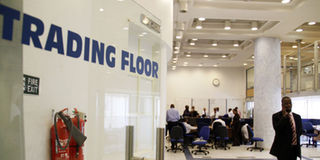End of an era as Nairobi Securities Exchange moves base to Westlands

PHOTO | DIANA NGILA | FILE The Trading Floor of the Nairobi Securities Exchange at the Nation Centre, Nairobi.
What you need to know:
- The stock market joins a growing list of companies — including banks — that are moving away from the CBD to other parts of the city, especially in Upperhill, Westlands and Mombasa Road
- The market started operating informally in the 1920s but was officially constituted in 1954 as a voluntary association of stockbrokers registered under the Societies Act
- In 1990, a trading floor and secretariat was set up at the IPS building, before moving to the Nation Centre in 1994
After 58 years stay in the city’s central business district, Nairobi Securities Exchange is making an exit to a new home in Westlands.
The bourse will be relocate to Tosica — a five-storey building located at 55 Westlands Road. The relocation is expected to be complete before the end of the year.
“We have shareholders who expect us to return value for their investment and moving to our own premises will see us earn extra income in addition to selling of data and information from our website,” Mr David Ouma, the head of market and product development at the NSE said on Wednesday.
Mr Ouma, however, did not disclose how much they brought the building for. They will be leasing 70 per cent to other uses.
The stock market joins a growing list of companies — including banks — that are moving away from the CBD to other parts of the city, especially in Upperhill, Westlands and Mombasa Road.
The market started operating informally in the 1920s but was officially constituted in 1954 as a voluntary association of stockbrokers registered under the Societies Act.
Until the 1990s, about six stockbrokers would meet and conduct transactions from the Stanley Hotel, which operated as the Nairobi Stock Exchange.
In 1990, a trading floor and secretariat was set up at the IPS building, before moving to the Nation Centre in 1994.
Over the past decade, the securities exchange has witnessed numerous changes, automating its trading in September 2006 and in 2007 making it possible for stockbrokers to trade remotely from their offices, doing away with the need for dealers to be physically present on the trading floor.
Trading hours were also increased from two to six.
Moving to Westlands will symbolically mark the end of an era where the market was owned and run by stockbrokers.
It is expected that by mid next year, the bourse will change its ownership structure by selling shares to the public.
“We will complete the demutualisation process by the end of the second quarter of next year after which we plan to list at the alternative market segment,” Mr Ouma said.
The planned change of ownership is meant to transform the market from being a members club (or a mutually owned entity) to a company limited by shares.
But it has been delayed by conflicting interests over the new shareholding structure between the Capital Markets Authority, stockbrokers and the governments.
Raised fears
Under the plan, Treasury is expected to own 20 per cent and the brokers will share the remaining 80 per cent. The delay has raised fears that it could impact on confidence in the exchange that is keen to attract new firms such as small and medium enterprises (SMEs) to list on its growth segment.
The NSE’s image has been battered by a series of stockbroker collapses in the past five years, beside uninspiring performance of a number of IPOs such as Safaricom.
“We will also launch the Kenya government bond index in October to help investors independently monitor the performance of the bonds,” Mr Ouma said.




